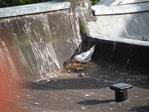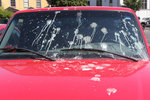From her office window on the fourth floor of the Mount Baker Block Building, Janette Force has an excellent view of the damage done by gulls, and of her neighbors’ attempts to drive them …
This item is available in full to subscribers.
We have recently launched a new and improved website. To continue reading, you will need to either log into your subscriber account, or purchase a new subscription.
If you had an active account on our previous website, then you have an account here. Simply reset your password to regain access to your account.
If you did not have an account on our previous website, but are a current print subscriber, click here to set up your website account.
Otherwise, click here to view your options for subscribing.
* Having trouble? Call our circulation department at 360-385-2900, or email our support.
Please log in to continue |
|



From her office window on the fourth floor of the Mount Baker Block Building, Janette Force has an excellent view of the damage done by gulls, and of her neighbors’ attempts to drive them off.
“We humans think we’re advanced,” said Force, executive director of the Port Townsend Film Festival. “But the birds are playing biological warfare, and they’re succeeding at it.”
Strands of wire line the edges of many downtown roofs, but don’t prevent gulls from perching on ledges and poles. Fake owls, often covered in gull poop, are not effective for long.
“It seems like we just can’t win,” Force said. “I haven’t seen anyone completely successful.”
Richard Probst, Mount Baker Block Building manager, agrees.
He’s spent years working to keep gulls away from what is one of downtown's largest buildings, wrapping every exposed ledge in wire, only to watch as the gulls exploit the smallest holes in his defenses.
And efforts to remove gulls are complicated, because migratory birds are protected by federal law, making it illegal to disturb inhabited nests.
“I’ve surrendered,” Probst said. “The gulls and I have compromised; they live their life and I live mine.”
Lately, he’s attempted to stop the problem before it begins. Each year in April and May, he goes to the roof and cleans away empty gull nests.
Gulls typically lay eggs in spring, which then hatch in July and August.
According to Probst, gulls often return and lay eggs where they were born, so by removing nests every spring, he hopes to break the cycle and discourage the birds from returning.
Gulls haven’t caused much damage to the building’s roof, Probst said. In the past, however, they have damaged the building’s heating and air conditioning units.
Many older models of air and heating units have grills low to the ground, at a distance easily accessible to gulls. Taking advantage of this, the birds break into units, rip out wires and nest inside. The damage done to the Mount Baker Building’s units was so extensive that new heating and air units – with less accessible grills – were installed.
Ron Sikes, secretary of the Admiralty Audubon society, a wildlife conservation group, has noticed an usual amount of gulls this year.
"Based on my observations there are more gulls in Port Townsend and at Point Hudson than I've ever seen before," he said.
Sikes isn't sure what exactly is causing the influx of birds, but he believes the unusual weather is playing a role.
However, like with most animals, availability of food is paramount. Either more food is available for the gulls in Port Townsend this year, or less food is accessible in other areas, Sikes suggested.
Washington State Department of Fish and Wildlife collects statistics on gull populations, but has not analyzed them for this year, a spokesperson said Aug. 18.
THE DROUGHT
In a year with normal precipitation, Port Townsend Public Works washes city areas, such as parks, to keep them clean of fecal matter.
Not this year. The City Council has enacted water conservation guidelines for residences, businesses and itself. As of earlier this month, the city is no longer cleaning up after the gulls, said Ken Clow, the city's public works director, and that includes the Salish Sea Circle art piece and plaza.
“It’s extremely difficult to keep up with the birds at this time of year,” Clow said. “With the water shortage reducing our water usage, we’re not able to clean as much.”
Individual property owners are responsible for the cleanliness of sidewalks in front of their buildings.
Typically, the Port Townsend Main Street Program hires a maintenance worker and a pressure washer to clean sidewalks. However, the program is on hold this year, due to water restrictions caused by the drought, said Mari Mullen, executive director of the PT Main Street program.
THE HEALTH RISK
Bird droppings are associated with a number of human diseases, typically fungal infections, said Dr. Tom Locke, Jefferson County’s health officer.
Infections spread through direct contact with fecal matter.
“The only way to spread infections is if droppings get into your water or food,” Locke said.
Jefferson County Public Health has noticed strains of antibiotic-resistant bacteria spreading into bird populations.
“If these birds caused infection in a human, the disease would be resistant to treatment,” Locke said.
Ultimately, preventing infection is a relatively simple matter. Avoiding contact with fecal matter, not eating or drinking from unknown food and water sources, and washing hands before eating are all effective steps to prevent the spread of disease.
Locke is not aware of any avian-transmitted diseases causing harm to humans in Jefferson County.
SOUND DEFENSE
The Port Townsend Main Street Program sent members a newsletter in March offering advice on dealing with gulls.
One of the biggest factors in any successful bird abatement program is participation. Elaborate defenses are not much good at reducing the number of gulls if owners of the building next door do nothing.
Clearing empty nests in early spring is essential. Other options include repairing buildings to eliminate cracks or crevices where birds might perch, draining standing pools of water and keeping garbage contained.
Doc’s Marina Grill at Point Hudson has tried a more high-tech approach: sound-emitting sensors. The restaurant has outdoor seating, but no umbrellas can be used due to high winds. The sound system – silent to humans – has been successful at keeping birds away from the restaurant, said Teresa Whitney, manager.
“I’ve seen a lot of seagulls this year,” Whitney said. “More than I’ve ever seen before, and they won’t even fly over our deck.”
Most of the other red roofs at the Point Hudson complex are stained white.
Some businesses try fighting; others try adapting.
The Bishop Victorian Hotel on Washington Street offers complimentary earplugs at the front desk. And sitting in the same bowl as the earplugs is a picture of a gull.
A.J. Baker, a receptionist at The Bishop, said guests make full use of the earplugs. She’s noticed the noise from the gulls being a bit louder this year. Most guests don't mind the noise, recognizing this is all part of living or visiting Port Townsend.
“Gulls are just part of the seaport living,” Baker said. “Part of the charm.”